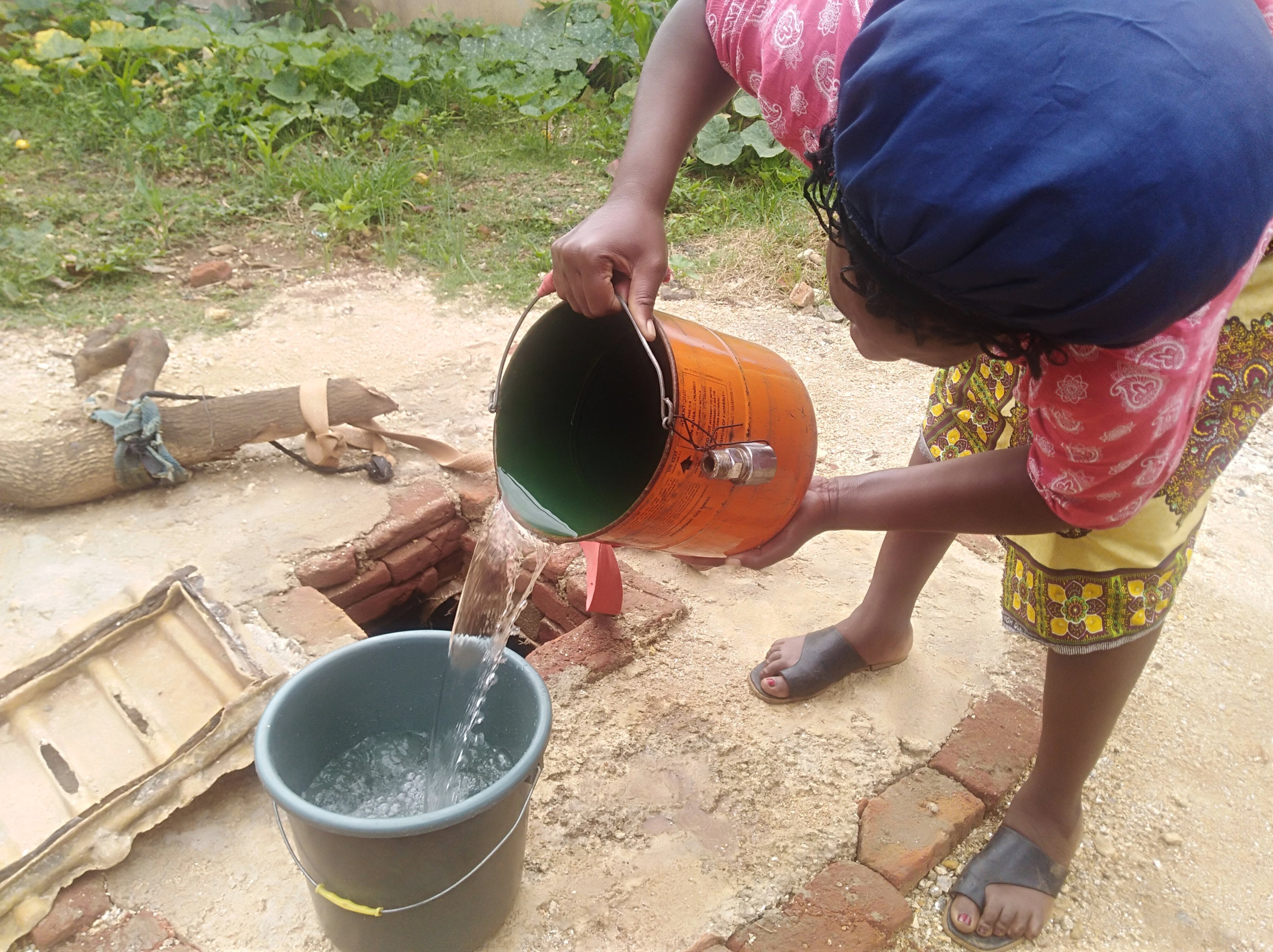As climate change continues to ravage Zimbabwe and other nearby countries in the Southern region of Africa, the rising temperatures have seen many people struggling for survival and fighting water borne diseases like cholera and typhoid.
Thirty-eight year old Martha Garudzo from Zimbabwe’s largest city and capital, Harare, gets up at 4 am every day to queue for clean and safe water at a local community borehole. Due to high demand, the borehole only opens for 4 hours a day from 8 am.
Garudzo, a mother of four, said that it is better to queue for 4 hours for water rather than risk her children contracting cholera as she believes the tap water is not safe.
“The water is no longer safe. I wake up early because all my children go to school. We have a water-well but it is not safe since there is a cholera outbreak, people are dying,” she said.
Martha Garudzo, fetching water from an unsafe source in Harare, Zimbabwe. Photo Credit: Shorai MurwiraGarudzo has witnessed her family members vomiting but due to their religion and church doctrine, they have not sought medical attention.

“We have a shortage of purified water and it’s been 17 years since I moved here from my rural area, but for all those years we have never had safe water, we rely on open sources and boreholes,” she said.
Experts have warned that Zimbabwe could face its second worst cholera outbreak since 2008. Since 12 February 2023, when the first case was reported, the country has registered a cumulative total of 18,865 suspected cholera cases, 71 laboratory confirmed deaths, 336 suspected deaths and 215 laboratory confirmed cases, according to data issued by the Health Ministry.
As the number of cases rises, the issue of safe water is greatly contributing to the heightening panic. Zimbabwe’s urban cities, including the capital Harare, have been facing water shortages on a regular basis with some of its suburbs now having been without purified water for more than 20 years. Added to this, the authorities have confirmed that water levels in the dams that supply the cities have been falling due to the effects of climate change.
The Mayor of the city of Harare, Jacob Mafume, told DevelopmentAid that the available supply of potable water has fallen from 350 megaliters to 200 megaliters per day.
“We had to decommission the Hararava dam where the Prince Edward waterworks are situated for a period because the water levels had declined to the point where it was not possible for us to operate. The situation is the same with Lake Chivero where the levels of water had been dropping but now have now risen slightly since we are in the rainy season but, as the temperatures rise and unstable work practices persist, people face unpredictable challenges,” said Mayor Mafume.
Shortages of water and rising temperatures have forced less well-off residents in Chitungwiza town to resort to unprotected water sources whereas the more wealthy are fortunate enough to have boreholes drilled at their homes.
Tafadzwa Kachiko, the Chitungwiza town council spokesperson, said that the town council was aware that “unprotected water sources are being contaminated by diseases” and the only thing it could do was to advise people to use borehole water.
Kachiko also said that other factors contributing to the spread of cholera were the dumping of garbage throughout the city and contaminated water flowing into sources due to the rains.
Water crisis and human rights
Harare’s infrastructure for piped water was developed in the 1950s under the British government. It was initially designed for a population of 300,000 but with rural to urban migration due to hunger and droughts in the rural areas, its population currently stands at about 4.5 million people. As the city’s infrastructure has seen practically no work to improve it, people have no access to clean water with most using shallow wells and therefore facing the risk of waterborne diseases such as cholera and typhoid.
Human rights lawyer, Obey Shava, commented that due to the water issue people’s rights to life, a clean environment, and food have been violated.
“We are witnessing the recurrence of medieval diseases like cholera in urban areas as a result of the absence of clean and safe water to drink. Fundamental rights such as dignity, life, among others are being violated.”
Tapuwa O’bren Nhachi, Natural Resource Governance and Climate Change expert, said Zimbabwe could again face the same nightmare as the 2008 cholera outbreak which killed 4,200 people and saw another 100,000 affected.
“The city’s perennial water crisis, which is linked to the cholera outbreak, is the result of its water infrastructure, droughts, and pervasive government corruption and mismanagement. Poor governance and disputes between the central government and the Harare City Council have hindered efforts to address the problems,” explained Nhachi.

